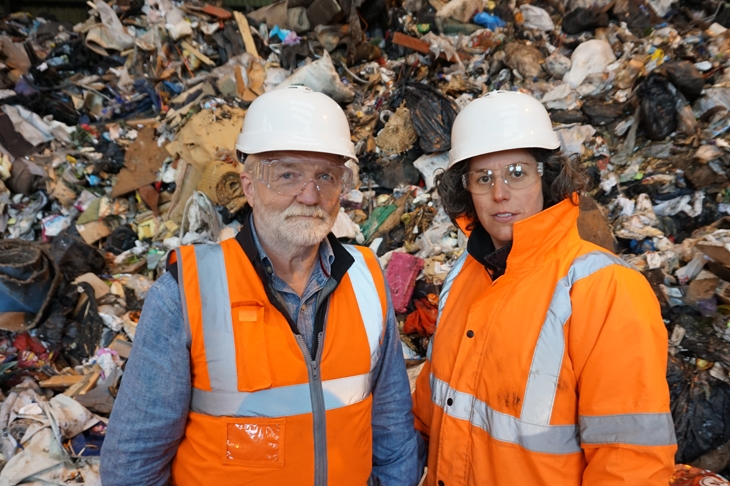Not the most beguiling of titles, I admit, but The Secret Life of Landfill: A Rubbish History (BBC4, Thursday) was a genuine eye-opener. The programme began with Dr George McGavin proudly announcing that ‘What we’re about to do has never been attempted on television before’: a claim that it’s usually best to treat with some scepticism, but that here seemed hard to deny. Certainly, I can’t remember another TV documentary in which the presenters spent 90 minutes digging through (non-metaphorical) rubbish.
At first, the mood was one of rather determined excitement. McGavin twinkled away Scottishly behind his half-moon specs as he bombarded us with statistics about the hundreds of tons of trash that arrives in the Dunbar landfill site — aka the programme’s ‘headquarters’ — every day. Meanwhile, Zoe Laughlin, material scientist and McGavin’s ‘partner in grime’ (geddit?), rooted about in the dirt, emerging with a series of apparently thrilling finds: pill packaging, a digital watch and at one stage even a charcoal briquette. (Sadly, she was slightly outdone by the site’s manager who recalled the day he had to compact a 50-ton whale.)
Before long, though, things took a turn for the gloomy. Realising how quickly the huge site would fill up, McGavin was understandably struck by the lack of thought we give to our rubbish once we’ve dumped another bin-bag in another bin. ‘How did we reach the point when we throw away so much and value so little?’ he lamented sorrowfully, before stalking meaningfully out of shot.
But as it transpired, this wasn’t a rhetorical question — because from there, the programme interspersed its Dunbar scenes with trips to great landfills of yesteryear. In Great Yarmouth, McGavin pinpointed the birth of the throwaway culture as the 1890s by digging beneath some former sand dunes and discovering any number of late-Victorian bottles and jars. More worryingly, he visited one of many coastal sites from the 1960s that are now eroding, with the result that asbestos and carcinogenic batteries are being released into the sea.
For a while, this threw McGavin into full Private Frazer mode. But just as you feared that the programme would be merely another worthy exercise in ecological head-shaking, the mood changed again. To their credit, it appears that scientists — unlike say, newspaper columnists — aren’t content merely to revel in how doomed we all are. Instead, they’d quite like to do something about it. Already the methane produced by properly sealed modern sites is used to create electrical power — and microbes are being identified that can digest plastic (‘a fantastic material’ that we’ll ‘need in our future’, as Zoe Laughlin heretically described it).
Above all, landfills could be easier to mine for precious metals than mines are. To produce a gram of gold, for instance, you need either a ton of gold ore or 40 discarded smartphones. The sites could also be a handy source of the sort of rare-earth metals than have caused ‘12 wars in the Congo in the past decade alone’.
‘The idea of landfill mining,’ concluded McGavin with a flourish, ‘is a pretty compelling vision of the future’; a remark that before watching this weirdly absorbing programme I couldn’t have imagined ever hearing, let alone nodding along sagely with.
The good news for the makers of Eight Go Rallying: The Road to Saigon (BBC2, Sunday) is that the series received plenty of advance publicity. The bad news is that most of it consisted of Noel Edmonds, one of the participants, denouncing the whole thing as ‘the worst kind of reality TV’ fakery, with some of his fellow celebs on the classic-car drive from Northern Thailand to the Vietnamese capital taking taxis.
Not unreasonably, the BBC’s response was to tell Noel that he hadn’t yet seen the programme, and should save his comments until he had. Sure enough, on Sunday the taxi-taking turned out to be not only unhidden, but fully explained: old cars sometimes break down — especially when they’re Hillman Imps driven by Tinchy Stryder. Indeed, judging from this opening episode, the main problem might have been that Noel took the rally far more seriously that he was supposed to: making no secret of his desire to win — even though it wasn’t a race — and, at one point, sternly rebuking his wife for her less-than-perfect clutch control. (‘This could be a long day,’ she sighed in response.)
The real clincher, however, is that if the makers had faked the show, they’d surely have faked a more interesting one. Sunday’s programme did perk up a bit when Martin and Shirlie Kemp’s Mini rolled over, leaving him with a bruised hand. Otherwise we essentially got an hour of people driving along while consulting maps and chatting aimlessly — before meeting at the night’s hotel for an in-depth discussion of which routes they’d taken.






Comments